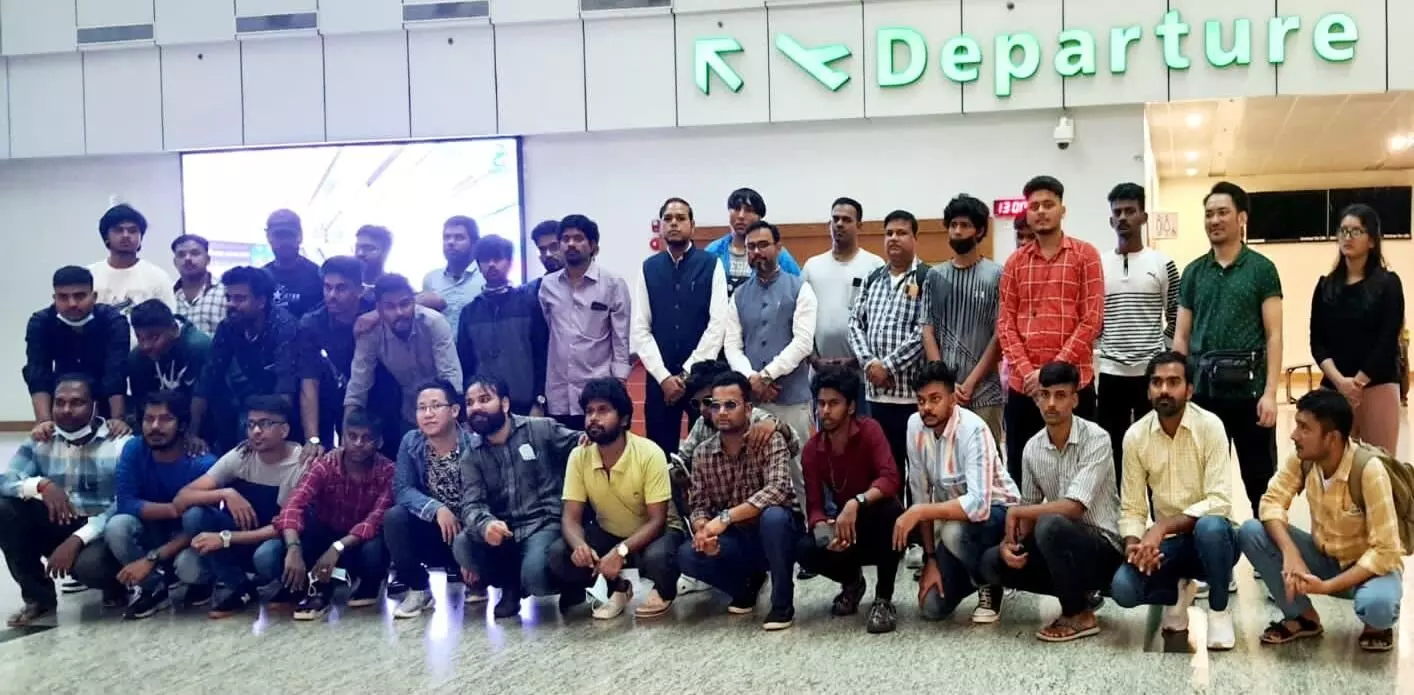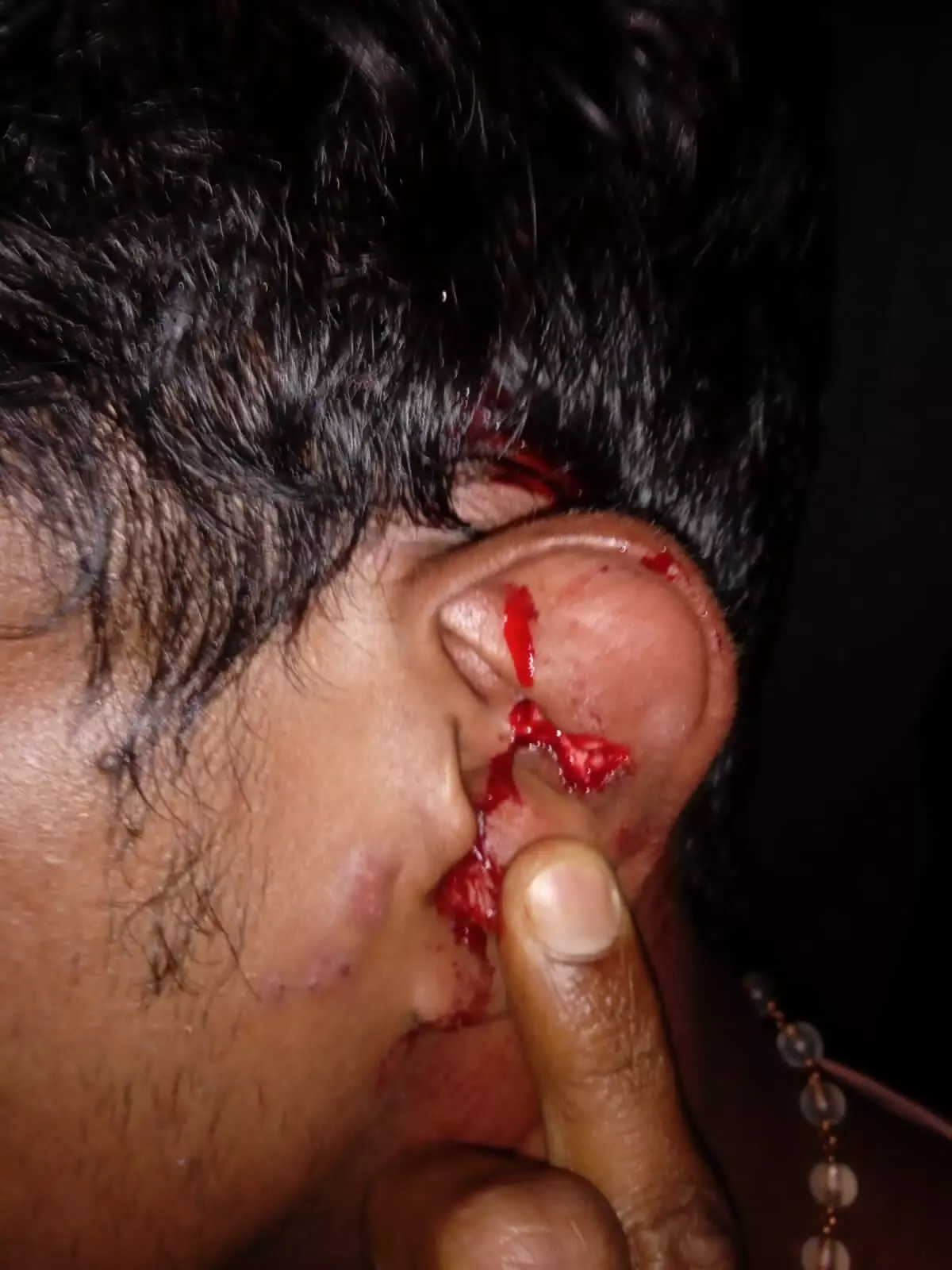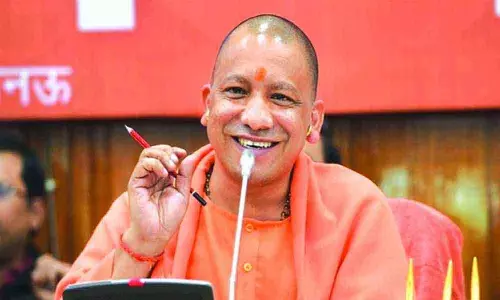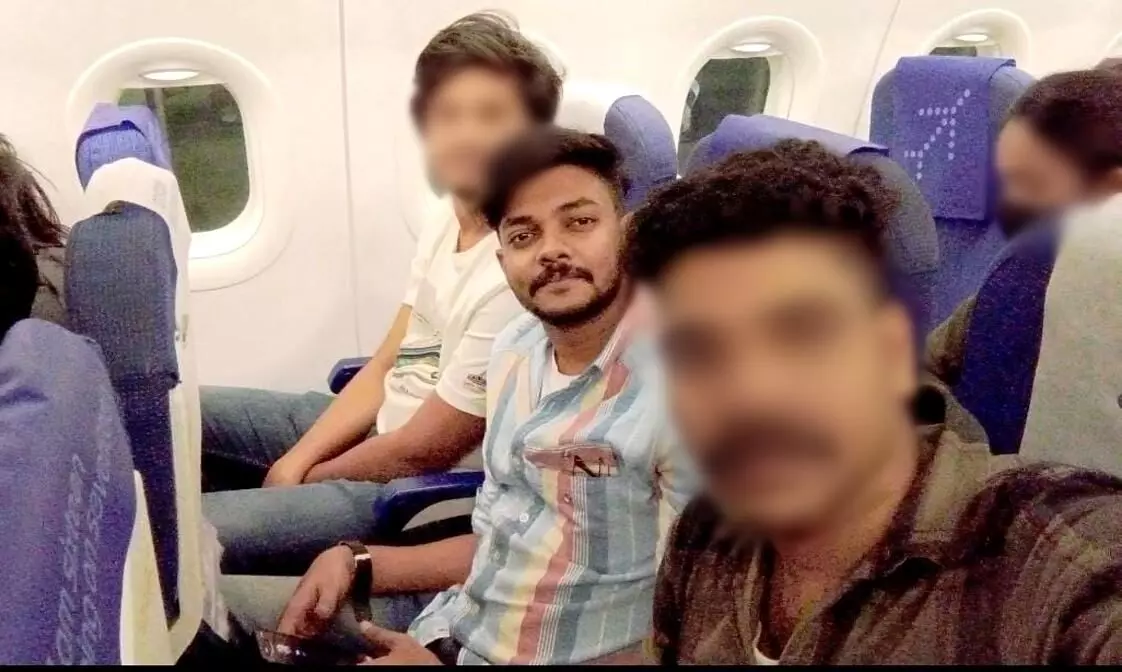
Crime File -1: Human trafficking, the real story
text_fieldsSinaj in the middle
A blood-curdling story of three Indian youths recruited by human traffickers in Thailand and transported to Myanmar by cybercrime gangs. In Southeast Asia, they worked as hackers and scammers in fraud factories.
They were subjected to brutal physical torture and witnessed horrific acts of violence against fellow workers. Several times, they were tortured to the point of death. By taking secret videos and bringing them to the authorities, they became heroes. Their actions resulted in the rescue of more than 2,000 Indians. They continue to fight legal battles against human traffickers in India.
'I want to see my mother' - Sinaj kept saying every moment he regained consciousness. However, those who were with him had no hope that Sinaj would be able to recover. There they were, in the middle of cornfields, surrounded by a band of armed assailants from a country whose language they could not speak. Sinaj was on the edge of consciousness and unconsciousness, breathing in black smoke and suffering from respiratory distress directly due to allergies.
Services for specialist treatment were not available to him. The body's oxygen level was low. Although the clinic's nurse and pharmacist used five or six oxygen cylinders, they were unable to save him from the depths of unconsciousness. The two of them stood helpless. Distraught by the roommate's cries for help, a man with a gun brought the doctor after an hour. Sinaj woke up the next day after his treatments.

Sinaj Saleem, a BTech graduate from Kerala, flew to Bangkok, Thailand's capital, in order to solve his problems. He was employed in Kerala. He felt the same way when his best friend advised him to get a job abroad because life would not be easy with a salary of Rs 17,000 per month.
The Covid pandemic rendered 2019 and 2020 unremarkable for most people. In 2021, all job seekers started a new chapter in their lives with new dreams in mind. At the time, Sinaj was 27 years old. He calculated that if he went abroad now, he would be able to settle his debts and start a new life within a few years. To this end, he met the agent of the recruiting agency who was an acquaintance of his friend. It was planned to apply for a data entry position in Thailand through this agent. The initial salary offer was Rs 70,000.
Compared to the current position, it was an attractive offer. In addition, he assumed that once he arrived in Thailand, he would be able to find a better job while working there. He borrowed Rs 1.20 lakh from his brother and sent it to the agency. The Chennai-based agency provided him with a flight ticket and information about booking a ten-day hotel room in Thailand.
According to the agency, there would be an interview in Thailand, and if he won, he would be hired, otherwise, he would be required to return home. The company assured him that he would be hired after one or two interviews and would not be required to return since he would be granted a visa upon arrival. Sinaj, however, was in the hands of the attackers by the time he realized that the agency was a main link for human traffickers and that all the information that they had given about the job was false.
Tears of pain
Sinaj's mother Selina hugged him and kissed him on the forehead before he checked into Cochin International Airport. "May my son always be well" - the words hung in his mother's throat as she parted with her son. With tears in her eyes, she told him, "If anything is difficult, my son should come home." He hugged his mother and cried. Then, he walked into the airport to give wings to his dreams. It was not known to Sinaj at that time that he had been sent to hell and that the same mother's chest pains would cause him to return.
On July 20, 2022, Sinaj Salim began his journey. A 23-year-old computer science graduate from Alappuzha was also present. As soon as he reached Bengaluru, he met a Varkala native. (Name not mentioned here due to current circumstances).

For children's sake
The Varkala native, 29, worked as an assistant manager for a fibre optic cable company, and his wife was employed by a local automobile insurance agency. The owner of the automobile insurance company was a human trafficking agent. The young man was informed that he would be hired by an upcoming start-up company in Thailand. This agent requested that the 29-year-old pay him 30,000 rupees. After learning of the better pay and facilities available in Thailand, he decided to leave Kerala. He boarded the plane in the hope of providing a better life for his wife and two young children in grades one and three.
An official from the company met the three upon their arrival at Thailand's airport. In order to verify the identity of the applicant, the passport and identity cards were taken from him. The official stated that they would return them once a visa had been issued. Additionally, this officer instructed them to delete the details of the call from their phones. Sinaj did not delete the messages despite feeling terrible. Instead, all correspondence was sent via email. In the meantime, they were transported to Bangkok by a vehicle.
They believed that the gun held by the driver and the next individual was a security measure. The distance between Bangkok city and the airport was 45 kilometres. The danger was, however, realized when the journey continued for three hours without an end. In the course of the 450 km journey, which took nine hours, the car left the city and the tribal villages behind. The vehicle arrived at a place where all that could be seen was corn fields. On the mud road, there was a truck waiting to transport them. Armed men in military uniforms were present.
A deserted area was traversed by the vehicle. A long walk later, they were taken to a secluded area. A motorized boat was waiting to cross the river. As soon as they reached the other side, they realized how horrendous the hell was. Later, they realized that they had crossed the Moi River and entered Myanmar. It appeared to be a military camp in the area. There were young men with guns standing guard everywhere. They are all between the ages of 18 and 20. There were several warehouse-like structures constructed of gypsum board and nuts and bolts surrounded by cornfields. In the tower, armed guards stood stationed 24 hours a day. In the course of time, it has been identified that all of the individuals are Malaysian-Chinese.
There were thousands of workers in the camp. A number of companies were located in the area, as well as more than two thousand Indians. The camp was located in Myawaddy, Kayin State in the south-eastern region of Myanmar. Separated from the Thai border town of Mae Sot by the Moi River, the city is a major trading centre between Myanmar and Thailand. Human trafficking, cyber fraud centres, online gambling, prostitution, and drug use have been prevalent in the area since 2010.
Buildings not on Google Maps
It is not possible to locate the camp where they lived in Myawaddy, Myanmar on Google Maps. Buildings were hidden and concealed by fraud factory owners using technology. A black-clad security force stood guard. It is built in the form of a small township with a bank and a clinic. The township extends 30-40 kilometres. Mae Sot, in the west of Thailand, also has such townships.
Those who were hired for data entry jobs were used for cybercrime. The 'job' involves extorting money from people through online gambling, scamming, cryptocurrency transactions, and online games. These hackers steal bank account information through Love Chat. A number of people from Australia, New Zealand, and the United States were targeted. There are many Keralites who are victims of cyber scams.
In addition to Indians, many people from Russia, Pakistan, Uzbekistan and Malaysia have been brought here with fake job offers as cybercrime employees. Depending on their length of stay, they would be assigned level one, two, and three jobs. Social media accounts that are inactive will be hacked. By using it, 'part-time work' opportunities will be advertised.
It targets housewives, unemployed youth, and pregnant women who feel they must work at home to support their families, and in addition, those who have gone abroad to study and are seeking part-time employment. It is the first level's responsibility to collect the name, age, and WhatsApp number of candidates who approach for the job after seeing these advertisements. By contacting these WhatsApp numbers, level two installs apps for crypto businesses. A third-level hacker informs the victim that $100 has been deposited into their account and encourages them to gamble. At the beginning of the season, it is likely that they will win five to six games.
Meanwhile, they will be led to believe they have received 200 dollars. The victims will have become addicted to online gambling by that time. This is how the game proceeds, and at a certain point, the entire amount in their bank account is withdrawn at once. By that time, the victims would have sold a number of items, mortgaged them, and been indebted to the tune of lakhs of rupees. Cars and houses have been sold by some individuals. It is inevitable that some people will commit suicide. Sinaj and his Kerala friends were first-level employees of the company.
...to be continued...
Banner Photo - The three Keralites responsible for the youth's escape, Sinaj in the middle (faces of others obscured for security reasons)
























